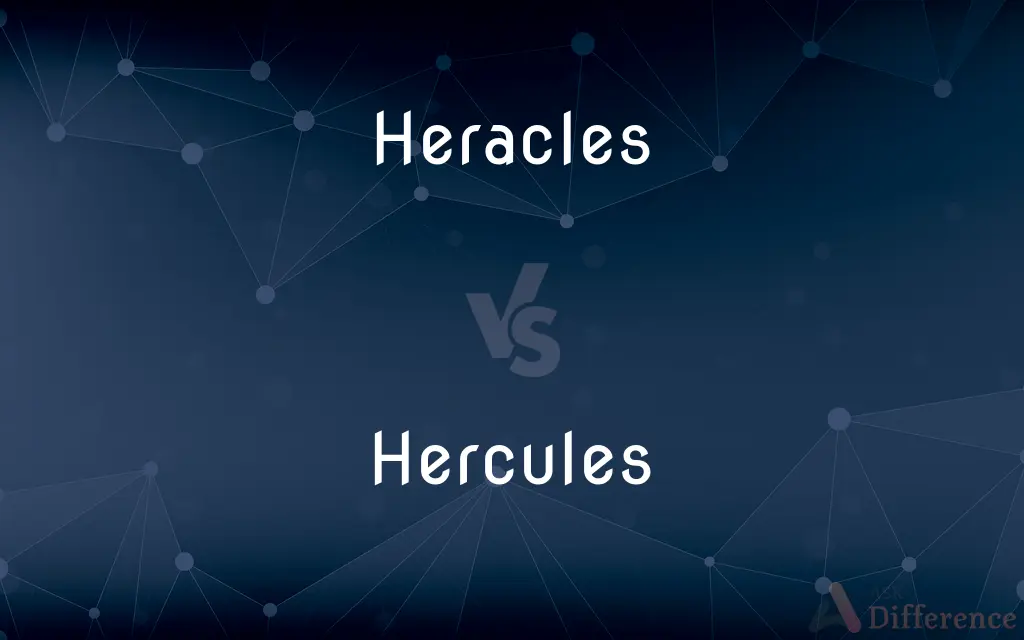Heracles vs. Hercules — What's the Difference?
By Tayyaba Rehman & Maham Liaqat — Updated on February 22, 2024
Heracles is a hero from Greek mythology known for his strength and 12 labors, while Hercules is the Roman adaptation of the same hero, emphasizing his god-like power and moral lessons.

Difference Between Heracles and Hercules
Table of Contents
ADVERTISEMENT
Key Differences
Heracles is a central figure in Greek mythology, celebrated for his extraordinary strength and for completing the Twelve Labors, tasks so difficult they seemed impossible. These labors were penance for a crime, showcasing themes of redemption and the human struggle against adversity.
Hercules, on the other hand, is the Roman name for Heracles and carries a slightly different cultural significance. While the feats and stories largely overlap, Roman mythology often highlights his role as a symbol of virtue and moral strength, integrating him more deeply into Roman religion and society.
The depiction of Heracles in Greek art and literature emphasizes his heroic journey and trials as a demigod, son of Zeus and the mortal Alcmene. This focus reflects the Greek appreciation for the complexities of heroism, including flaws and redemption.
Hercules in Roman culture is often portrayed as a more straightforward symbol of strength and protector of mankind. His image was used by Roman emperors to symbolize power and divine right, blending mythology with political propaganda.
The narratives around Heracles and Hercules, while essentially telling the same stories, are influenced by the cultural contexts of Greece and Rome. Greek texts delve into the psychological and emotional aspects of his trials, whereas Roman stories may place greater emphasis on moral and societal lessons.
ADVERTISEMENT
Comparison Chart
Origin
Greek mythology
Roman mythology
Significance
Embodies strength, heroism, and the potential for redemption
Symbolizes god-like strength, moral integrity, and protection
Cultural Context
Focuses on personal struggle, complexity of character
Emphasizes virtue, societal roles, and imperial propaganda
Depiction
Often portrayed in the throes of his labors, highlighting his human side
Frequently depicted as a larger-than-life hero, often with a club and lion skin
Legacy
Influenced Greek culture, art, and literature, emphasizing the hero’s journey
Integrated into Roman state religion and used as a symbol of imperial authority
Compare with Definitions
Heracles
Represents the archetype of the Greek hero.
Heracles' journey inspired many Greek myths about heroism and struggle.
Hercules
Depicted as a muscular hero, often with a club and lion skin, in Roman art.
Statues of Hercules often adorned Roman public spaces.
Heracles
A legendary Greek hero known for his immense strength and for completing 12 labors.
Heracles' first labor was to slay the Nemean Lion.
Hercules
A symbol of moral and physical power in Roman mythology.
Hercules was worshipped as a god who protected both individuals and the state.
Heracles
Celebrated in various forms of Greek art and literature.
The plays of Euripides often feature Heracles as a tragic hero.
Hercules
Integrated into Roman culture as a model of virtue.
Roman children were told stories of Hercules to inspire moral integrity.
Heracles
Son of Zeus and Alcmene, often depicted struggling against impossible odds.
Heracles wore the impenetrable skin of the Nemean Lion as armor.
Hercules
Used by Roman emperors as a symbol of power and divine right.
Commodus famously identified himself with Hercules to assert his strength and legitimacy.
Heracles
A figure of suffering and redemption in Greek mythology.
Heracles completed his labors to atone for a great crime.
Hercules
A constellation in the Northern Hemisphere near Lyra and Corona Borealis.
Heracles
Heracles ( HERR-ə-kleez; Greek: Ἡρακλῆς, Hēraklês, "Glory/Pride of Hera"), born Alcaeus (Ἀλκαῖος, Alkaios) or Alcides (Ἀλκείδης, Alkeidēs), was a divine hero in Greek mythology, the son of Zeus and Alcmene, and the foster son of Amphitryon. He was a great-grandson and half-brother (as they are both sired by the god Zeus) of Perseus.
Hercules
Hercules () is the Roman equivalent of the Greek divine hero Heracles, son of Jupiter and the mortal Alcmene. In classical mythology, Hercules is famous for his strength and for his numerous far-ranging adventures.
Common Curiosities
How did Heracles become a hero?
Heracles became a hero through his extraordinary feats, overcoming great challenges and monsters, and completing his 12 labors as penance.
Why did Romans adopt Heracles as Hercules?
Romans adopted Heracles as Hercules, integrating him into their mythology and culture to symbolize strength, virtue, and the protection of the state.
What are the differences between Heracles and Hercules?
Heracles is the original Greek version of the hero known for his strength and complex narrative, while Hercules is the Roman adaptation that emphasizes his divinity and moral virtue.
Who was Heracles?
Heracles is a hero from Greek mythology known for his incredible strength and for completing 12 nearly impossible labors.
3What were the 12 labors of Heracles?
The 12 labors of Heracles were a series of tasks that included slaying the Nemean Lion, capturing the Golden Hind of Artemis, and stealing the apples of the Hesperides.
Can Heracles and Hercules be considered the same character?
While Heracles and Hercules refer to the same mythological character, their stories and significance differ between Greek and Roman cultures.
How are Heracles and Hercules depicted in art?
Heracles is often depicted in Greek art struggling with his labors, while Hercules in Roman art appears as a powerful, muscular hero.
How did Heracles achieve immortality?
Heracles achieved immortality through his heroic deeds, divine parentage, and eventually being welcomed to Olympus by the gods after his death.
Did Heracles have any weaknesses?
Despite his strength, Heracles faced emotional and mental trials, reflecting his human vulnerabilities alongside his divine heritage.
How do the labors of Heracles reflect ancient views on heroism?
The labors of Heracles reflect ancient views on heroism by emphasizing strength, perseverance, and the capacity for redemption through suffering.
What is the significance of the lion skin in depictions of Heracles/Hercules?
The lion skin, from the Nemean Lion slain by Heracles as his first labor, symbolizes his invincibility and heroic strength.
Were Heracles and Hercules worshipped?
Heracles had cults in Greece celebrating his deeds, while Hercules was actively worshipped in Rome as a god of strength and protector.
What is the legacy of Heracles and Hercules today?
The legacy of Heracles and Hercules endures in modern culture, symbolizing the ideal of overcoming adversity with strength and courage.
How did Hercules influence Roman society?
Hercules influenced Roman society as a symbol of moral strength, protector, and model of virtue, integrated into religious and cultural practices.
What role did Zeus play in Heracles' life?
Zeus, as Heracles' father, played a significant role in his life, granting him strength and eventually aiding in his rise to Olympus.
Share Your Discovery

Previous Comparison
Aerarian vs. Agrarian
Next Comparison
Absorber vs. AdsorberAuthor Spotlight
Written by
Tayyaba RehmanTayyaba Rehman is a distinguished writer, currently serving as a primary contributor to askdifference.com. As a researcher in semantics and etymology, Tayyaba's passion for the complexity of languages and their distinctions has found a perfect home on the platform. Tayyaba delves into the intricacies of language, distinguishing between commonly confused words and phrases, thereby providing clarity for readers worldwide.
Co-written by
Maham Liaqat













































